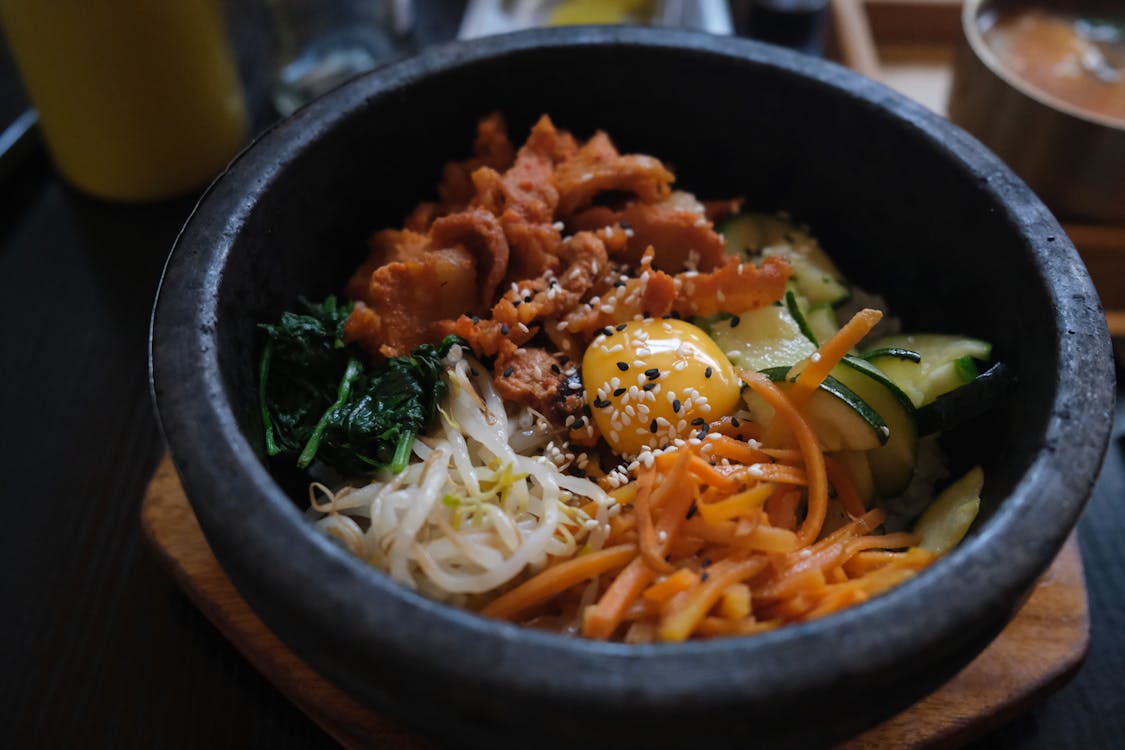🍚Korean Level 2, Activity 4: 한국 음식/ Korean Food

Description:
In this activity, students will learn the Korean terms that are said at dinner, restaurants, or when talking about going out to eat. Students will practice with their peers saying phrases to a server as well as being a server and practice saying polite phrases to customers.
Semantic Topics:
food(음식), rice(밥), kimchi(김치), meal(식사), menu(메뉴), restaurant식당), won (원, Korean currency), and customer(손님)
NCSSFL-ACTFL World-Readiness Standards:
- Students engage in conversations, provide and obtain information, express feelings and emotions, and exchange opinions.
- Students show an understanding of the cultural usage of kinship terms and titles to address and refer to people.
- Students use Korean vocabulary to share or present simple facts learned from other disciplines such as history, science, and music.
Idaho State World Language Standards:
- COMM 1.1: Interact and negotiate meaning (spoken, signed, written conversation) to share information, reactions, feelings, and opinion.
- CLTR 1.1: Analyze the cultural practices/patterns of behavior accepted as the societal norm in the target culture.
- COMP 1.1: Observe formal and informal forms of language.
NCSSFL-ACTFL Can-Do Statements:
- I can talk to a server in Korean ordering a meal
- I can ask a customer what they would like to order
- I can learn the proper phrases to ask someone about their day at a restaurant
Materials Needed:
Warm-Up:
- I can ask a customer what they would like to order.
저는 고객에게 무엇을 주문하고 싶은지 물어볼 수 있어요.
2. Students will practice common Korean foods and suffixes that are associated with Restaurant etiquette.
학생들은 식당 예절과 관련된 일반적인 한국 음식과 접미사를 연습합니다.
- salty stew: 찌개
- broiled meat or fish: 구이
- noodles: ~면
- rice-based dish: ~밥
Main Activity:
1. Practice the common greetings at a restaurant when you are meeting a friend.
식당에서 친구를 만났을 때 하는 인사를 연습해봅시다.
- Instead of saying “Hi, hello, How have you been? 밥 먹었어?
2. Students will also practice what to say when you are leaving your friend.
친구와 헤어질 때 하는 인사도 연습해봅시다.
- (Let’s have a meal someday) Goodbye, see you later. 나중에 밥 한번 먹자.
3. Students will then practice being a server and a customer with the following phrases.
학생들이 직원과 손님이 되어 아래의 문장을 연습해봅시다.
- Welcome! 어서오세요.
- How many in your party? 몇 분이세요?
- Please take a seat here. 여기 앉으세요.
- Would you like to order? 주문하시겠어요?
- Can I please have 00 of ________. ________ 00인분 주세요.
- I understand. 알겠습니다.
- Here is your ________. ________ 나왔습니다.
- Enjoy your meal. 맛있게 드세요.
Wrap-Up:
Practice more of the phrases you say after eating a meal.
식사 후에 하는 말을 연습해봅시다.
- To be full (=satisfy) 배부르다
- Thank you for the food(I ate well). 잘 먹었습니다.
End of Activity:
- Read Can-Do statements once more and have students evaluate their confidence.
- (Use thumbs up/thumbs down or download our student cards.)
- Encourage students to be honest in their self-evaluation.
- Pay attention, and try to use feedback for future labs!
NCSSFL-ACTFL Can-Do Statements:
- I can talk to a server in Korean ordering a meal
- I can ask a customer what they would like to order
- I can learn the proper phrases to ask someone about their day at a restaurant

